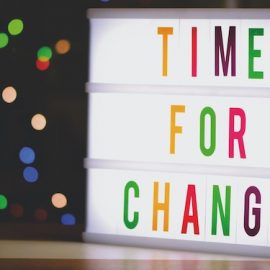

This article gives you a glimpse of what you can learn with Shortform. Shortform has the world’s best guides to 1000+ nonfiction books, plus other resources to help you accelerate your learning.
Want to learn faster and get smarter? Sign up for a free trial here .
Are you looking for the absolute best books about money? Do you want to increase your financial literacy and potentially start investing?
With so much financial material out there, it can be difficult to pick out the authoritative resources written by authors who don’t just preach theory but also offer actionable strategies to help you get to grips with your finances, understand basic investment principles, and start building wealth.
That’s why we’ve rounded up the following list of the absolute best books about money—written by financial educators with decades of experience, featured on well-known bestsellers’ lists, and positively rated by thousands of readers worldwide.
The Best Books About Money
Whether you want to take control of your financial situation, pay off debt, build wealth, or just learn how money works, this round-up of the best books about money will have you covered. To help you find the right read for you, we’ve divided our round-up into three categories:
If you are looking for advice on how to get to grips with your personal finances, check out the round-up of Best Personal Finance Books.
If you’ve got it all under control and want to learn investing principles and start growing your wealth, head over to Best Books About Wealth.
Finally, if you want to educate yourself on how money works in the grand scheme of things, check out Best Financial Literacy Books.
Best Personal Finance Books
Reading personal finance books will help you learn how to streamline your personal finances. At the most basic level, you’ll learn how to allocate money from your salary, how to create a debt repayment plan, and how to start saving towards big-ticket purchases. Some personal finance books also teach you how to plan for retirement and build wealth through investing.
Here’s our list of the best personal finance books and what people are saying about them.
I Will Teach You to Be Rich
Ramit Sethi is a self-taught expert and a popular blogger in the personal finance space.He was featured in many acclaimed media outlets including Fortune, The Wall Street Journal, and the New York Times. His book I Will Teach You to Be Rich became a New York Times and Wall Street Journal bestseller.
In I Will Teach You to Be Rich, Sethi helps you cut through the noise of conflicting and overly technical financial advice, get past your own hang-ups around money, and take small steps toward a “rich life”—whatever that looks like for you. You’ll learn how to use credit cards wisely, choose the right bank accounts and investment accounts, plan out your spending, and ultimately create a financial system that grows your money automatically.
What People Are Saying
The readers liked this book for its clear, jargon-free explanations of financial concepts and actionable money management advice.
The Barefoot Investor
Scott Pape is a radio commentator and the host of The Barefoot Investor personal finance TV show. Find his blog at The Barefoot Investor – Scott Pape.
In the book The Barefoot Investor, Scott Pape offers guidance and a 10-step plan for how to manage your money so that you eliminate debt and build wealth. Starting with establishing regular date nights with your significant other to discuss finances, the steps in this book will help you make informed money decisions. You’ll learn how to tackle a variety of financial issues, including:
- Getting rid of debt
- Saving up to buy a home
- Increasing your income
- Cultivating your long-term investments
What People Are Saying
Readers praise the book for its actionable advice on attaining financial security. The major sticking point is that it’s aimed at Australians (although many non-Australians still found the advice valuable).
Your Money or Your Life
In Your Money or Your Life, speaker Vicki Robin and financial analyst Joe Dominguez guide you through 9 steps to reach financial independence—not having to work for money. Unlike other personal finance books, this book is about more than budgeting. Rather, it’s about changing your entire relationship with money and, consequently, living a more meaningful life. You’ll learn to think of money as “life energy”—the time and energy you dedicate to paid work—and use this new mindset to align your spending habits with your values, purpose, and dreams.
What the People Are Saying
The book offers time-tested money management principles and valuable tips for cultivating a healthy relationship with money.
The Richest Man in Babylon
George Clason (1874 – 1957) was a successful businessman. He is credited with coining the phrase “Pay Yourself First.”
The Richest Man in Babylon by George S. Clason is a compilation of pamphlets offering financial advice that were distributed by banks and insurance companies in the 1920s. The book presents timeless principles for managing your money in the form of “Seven Cures for a Lean Purse” (how to acquire wealth) and “Five Laws of Gold” (how to preserve and grow wealth). The simple principles are illustrated by parables set more than 4,000 years ago in the wealthy city of Babylon. Clason’s message is that if you work hard, save, live within your means, and invest wisely, you can become wealthy.
What the People Are Saying
Readers praised the book for its entertaining way of teaching how to deal with money. However, many readers noted the book was hard to read because it’s written in old English.
Rich Dad, Poor Dad
No list of the best books about money would be complete without Rich Dad, Poor Dad by renowned financial educator and investor Robert Kiyosaki. Rich Dad, Poor Dad has been dubbed the #1 personal finance book of all time, selling over 35 million copies.
The premise of Rich Dad, Poor Dad is this: when growing up, Kiyosaki had two dads advising him. The first dad was Kiyosaki’s actual father (poor dad) who was a Stanford-educated Ph.D. who followed traditional career thinking and was financially illiterate. Dad number two (rich dad) was Kiyosaki’s father’s best friend and was a high school dropout who built a business empire, employing thousands.
The two dads are a parable for two different approaches to wealth: Poor Dad recommends getting a secure job with good benefits and retiring with a pension. Rich Dad recommends amassing assets that make money for you, becoming financially literate, and practicing independent thinking.
In this book, learn how to achieve financial independence, why it’s a terrible idea to see your home as your biggest investment, and how to overcome the biggest mental blocks to becoming wealthy.
What the People Are Saying
Rich Dad, Poor Dad is a great read if you are just starting out on your financial journey and need to get to grips with the basics. Readers liked the book for its readability and foundational teachings about money.
The Total Money Makeover
Dave Ramsey is a personal finance expert who authored several books on the subject. He also runs the personal finance show The Dave Ramsey Show and is the CEO of Ramsey Solutions. The Total Money Makeover became a New York Times bestseller, selling over 5 million copies.
In The Total Money Makeover, Dave Ramsey lays out simple steps for freeing yourself from debt and setting yourself up for success: following a monthly budget, buying only what you can afford, eliminating consumer debt, saving for emergencies, investing for retirement and your kids’ college education, and paying off your mortgage. Intended for everyone—from high earners to people with thousands of dollars in debt—Ramsey’s common sense principles put you in control of your money and your life.
What the People Are Saying
This is a great read if you are getting to grips with the elementals of financial literacy.
Poor Charlie’s Almanack
Charlie Munger is Warren Buffett’s long-time partner at Berkshire Hathaway. Content to being the lesser-known of the two, Munger is no less impressive. Bill Gates says that Charlie Munger “is truly the broadest thinker I have ever encountered,” and Buffett calls him the ideal partner who is “both smarter and wiser.”
Poor Charlie’s Almanack is a collection of Charlie Munger’s best advice given over 30 years, in the form of 11 speeches given as commencement addresses and roundtable talks. He covers a wide range of topics, including rationality and decision making, investing, and how to live a good life.
What the People Are Saying
Readers appreciated Poor Charlie’s Almanack for its timeless financial wisdom and readability. Some, however, noted that its lessons were too common sense.
The Best Books About Wealth-Building and Investing
Books about wealth-building and investing vary dramatically in the scope of the material they cover. At the most basic level, you’ll learn the elementals of investing (e.g. asset classes, types of stocks, types of brokers) and wealth management. Some books take it further and teach more advanced material such as different trading and portfolio diversification strategies.
Here is our selection of the best books about wealth-building and investing.
The Simple Path to Wealth
James Collins is a financial blogger at jlcollinsnh.com. The Simple Path to Wealth is a self-published book that grew out of a series of letters that Collins wrote to his daughter about personal finance management and investing.
In The Simple Path to Wealth, Collins offers a simple road map to achieving financial independence and a secure retirement: Spend less than you make, avoid debt, save “F-You Money,” and invest in stock index funds. He demystifies stocks and bonds, as well as a plethora of investment plan options. In addition to explaining basic concepts such as asset allocation, Collins answers key questions such as how to live on your investments and how to avoid major tax hits.
Whether you’re in the wealth accumulation stage of life where you’re growing your investments, or in the wealth preservation stage where you’re living on them, Collins tells you how to use your money to achieve freedom and a more fulfilling life.
What the People Are Saying
Readers praise the book for its readability, easy-to-understand explanations of complex topics, and actionable advice on building wealth and attaining financial independence. Many readers said it changed their lives and that they wish they had read it at a younger age. Some readers disliked the Vanguard emphasis and the bias against financial advisors.
The Science of Getting Rich
The Science of Getting Rich was a direct inspiration for the documentary The Secret by Rhonda Byrne.
The book’s central premise is that there is a science—a guaranteed method—to becoming rich. Anyone can learn this science, regardless of circumstance and talent, because it harnesses the natural tendencies of the matter of the universe.
Everything in the universe is made up of the same matter, and by nature, this matter favors the advancement of life. To advance, you need resources, and to get resources, you need money. Therefore, it’s in God’s and matter’s best interests to make you rich. All you have to do is act in harmony with the universe and harness its fundamental tendencies. Learn to use the power of your thoughts, your will, and your actions to achieve wealth.
What the People Are Saying
Reviewers found The Science of Getting Rich a very inspirational and empowering read.
The Intelligent Investor
The world’s greatest investor Warren Buffett read this book when he was 19 years old, and he still calls this “by far the best book about investing ever written.” Written by the father of value investing Benjamin Graham (1894-1976), it remains an inspiration for many of today’s most successful business people.
The book covers timeless ideas of how the market behaves, how investment is different from speculation, and how to identify profitable investments. You’ll learn whether you’re a defensive or an aggressive investor, why most trading strategies don’t work, and how to maintain control of your psychology in any type of market condition.
What the People Are Saying
Readers praised the book for its valuable investment insights. However, do keep in mind that it’s not a beginner’s book, so if terms like “net tangible assets” and “sub-working capital” have no meaning to you, you’d need to build up your foundation before you can reap value from this book.
Secrets of the Millionaire Mind
T. Harv Eker is a financial educator and speaker who went from zero to millionaire in less than 3 years. He runs seminars around the world and educates his worldwide audience through online courses. He also runs a blog on wealth and personal finance.
In Secrets of the Millionaire Mind, Eker reveals the difference between the way rich people and poor people think and feel about money. Eker argues that these thoughts and beliefs impel you to take actions that either move you toward financial success or away from it—if you’re not happy with the state of your finances, it’s because your unproductive thoughts and beliefs about money hold you back from the financial success that you want. According to Eker, you can dramatically improve your finances by taking conscious control of your thoughts and adopting a rich attitude that will inspire you to take new actions that lead to your financial success.
What the People Are Saying
Secrets of the Millionaire Mind is a motivational read rooted in the New Age thought. Many readers said it opened their eyes to the fundamental truths about money.
Fooled by Randomness
Nassim Nicholas Taleb is a Lebanese-American essayist, mathematical statistician, former option trader, risk analyst, and aphorist whose work concerns problems of randomness, probability, and uncertainty. Fooled by Randomness is one of the books in his landmark incerto series (the other books in the series are The Black Swan, Antifragile, Skin in the Game, and The Bed of Procrustes).
In Fooled by Randomness, Taleb examines the outsized role luck plays in success, how and why people don’t generally understand luck, and how we can accommodate randomness in our lives once we’re aware of it. Taleb primarily focuses on examples from the world of investing, but his principles are applicable to any field ruled by unpredictability (such as economics or politics) and demonstrate how we’re fooled by randomness in many aspects of our lives.
What the People Are Saying
Readers praise the book for Taleb’s original insights and unorthodox perspectives. Some even said the book revolutionized how they view the world.
Thinking in Bets
Annie Duke is a decision strategist and a former professional poker player. She merges her poker expertise with her cognitive psychology graduate work at UPenn. Her book Thinking in Bets became a Wall Street Journal bestseller.
In Thinking in Bets, Duke discusses how her decades-long poker career helped her develop decision-making strategies based on the idea that all decisions are bets. Being immersed in the game enabled her to observe how people make decisions in a setting where every choice leads to a clear outcome—winning or losing money. That’s what a bet is: a decision with quantifiable risk. You’ll learn how to work around your biases, objectively evaluate your beliefs, learn from your past, and ultimately get better at making good decisions.
What the People Are Saying
This book is an insightful read on decision-making in fields with a lot of uncertainty (e.g. trading, investing, poker, etc.), although it can be rather repetitive.
The Automatic Millionaire
Our round-up of the absolute best books about money wouldn’t be complete without The Automatic Millionaire by David Bach (who’s also the author of Start Late, Finish Rich; Smart Women Finish Rich and Smart Couples Finish Rich). The Automatic Millionaire held up as The New York Times bestseller for 31 weeks upon publishing.
In the book, Bach provides a simple but powerful action plan for you to quickly automate your finances, build your wealth, and achieve financial freedom. David Bach argues that, with just a few dollars a day, you can immediately benefit from this book’s advice and grow your finances.
What the People Are Saying
Readers praise the book for its readability and a step-by-step action plan that can be implemented by anyone, no matter where they are in the world.
Best Financial Literacy Books
Reading financial literacy books will help you learn how money works in the grand scheme of things. You’ll learn fundamental economic principles and how they play out in the real world, why people behave in certain ways, and the role of government in economic markets.
Here are our picks of the financial literacy books.
Naked Economics
Written by economics professor and a former columnist of The Economist Charles Wheelan, Naked Economics strips away the complexity from some of the most powerful theories in economics, allowing readers with little or no background in the subject to understand many of the field’s fundamental concepts. He concentrates on the logical pieces of how and why people behave in certain ways, how markets function, and how governments can design incentive systems that encourage healthy economies.
What the People Are Saying
Readers praise the book for its accessible introduction to economics and for using plenty of examples. Some readers noted that the book is oversimplified and liberal-leaning.
Basic Economics
Thomas Sowell is an American economist, social theorist, and senior fellow at Stanford University’s Hoover Institution. He authored over 30 books ranging from social policy and education to classical and Marxian economics.
Basic Economics is an incredibly useful, broad introduction to economics. Containing no math, it instead communicates intuitive principles that will help you understand how market transactions work and the effect of policies on the economy. You’ll learn how millions of individuals can buy and sell goods and services without a master coordinator, why we use money in the first place (instead of bartering out services with each other), and why some nations prosper while others stay poor despite vast natural resources.
What the People Are Saying
The book received outstanding reviews. Readers praised it for its readability, insight, and clear, jargon-free explanations of economic concepts.
The Undercover Economist
Tim Harford is an editorial writer at the Financial Times and a columnist in Dear Economist
In The Undercover Economist, Harford will teach you how to think like an economist without boring you with endless graphs or complex math. By thinking like an economist, you’ll use principles like scarcity, price targeting, the stock market, and game theory to make better decisions every day. By understanding these economic principles, you’ll learn how economics operates in everyday life, why you make the economic decisions that you do, and what happens when these principles break down.
What the People Are Saying
Readers praise the book for the explanations of the fundamental economic principles. However, some say the book is convoluted and hard to read.
Final Words
There are dozens of financial books out there, but they cover the subject from such a wide range of angles that it’s not easy to know which ones are applicable to your own goals. That’s why our list of the best books about money features books that address a wide breadth of financial topics, from basic principles to advanced investing strategies.
Enjoyed our round-up of the absolute best books about money? If any of these books piqued your interest, you are in luck because you are just a few clicks away from diving into their wisdom. Check out the summaries of the best books about money in the Shortform library.

Want to fast-track your learning? With Shortform, you’ll gain insights you won't find anywhere else .
Here's what you’ll get when you sign up for Shortform :
- Complicated ideas explained in simple and concise ways
- Smart analysis that connects what you’re reading to other key concepts
- Writing with zero fluff because we know how important your time is






